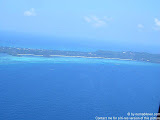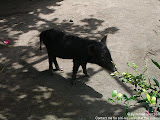Stalking The Flying Kangaroo – Texan tycoon seeks Qantas takeover; what’s in it for SIA?
by Tor Ching Li (chingli@mediacorp.com.sg)
 QANTAS Airways – which proudly touts itself as “the Spirit of Australia” – said yesterday that it could be bought over by a private consortium, including a Texan maverick who specialises in Extreme Makeover-style takeovers of the companies he buys.
QANTAS Airways – which proudly touts itself as “the Spirit of Australia” – said yesterday that it could be bought over by a private consortium, including a Texan maverick who specialises in Extreme Makeover-style takeovers of the companies he buys.
Analysts are divided over whether the largest takeover bid in aviation history, pegged at some A$11 billion, makes the lucrative Kangaroo route – from Sydney to Los Angeles – more attainable for Singapore Airlines (SIA), the Australian carrier’s long-time rival and failed merger partner.
In a statement released yesterday, Qantas called the offer from Macquarie, Australia’s largest investment bank, and Texas Pacific – founded by airline turnaround specialist David Bonderman (picture) – “confidential and incomplete”. Analysts believe the ultimate aim of the bid is to take the Australian Stock Exchange-listed national icon private.
From Aussie pride to foreign ownership restrictions – Qantas must remain majority-owned by Australians and no single foreign entity can own more than 25 per cent of it – there will be several hurdles to cross.
Mr Matt Crowe, a transport analyst with JP Morgan Chase & Co in Sydney, told Bloomberg: “It’s hugely ambitious. You’ve got the unions to get on one side, the government to keep on one side; it would be a landmark transaction and I don’t think anyone’s ever done anything like it.”
Anyone but 62-year-old Mr Bonderman, perhaps, who is no stranger to pulling off the impossible. His corporate daredevil stunts include buying over Continental Airlines, which had not produced a profit in 15 years, and having it turn a profit within two years. He bought the beleaguered airline in 1993 for US$70 million ($109 million) and sold it in 1998 for US$700 mil-lion – a ten-fold return on investment.
The Texas-based businessman has proven to be a turnaround tycoon with a series of such deals, including the rescue of American West, and his identification of the potential of Ryanair, the fast-growing Irish carrier he now chairs.
He also saw such an opportunity in Tiger Airways – the low-cost offshoot of SIA – which he shares a 24-per-cent stake in through Indigo Partners. The former law professor – who speaks Arabic and studied Islamic law in Cairo – ranked 46th this year in Forbes’ “Midas List” and is known to have the sharpest eye for aviation bargains.
His colleague on Continental’s board, Mr Tom Barrack, told Fortune: “I would spend endless hours reading arcane board books and David would roll in from someplace at 6.30 in the morning straight to the board meeting.
He’d go to Page 117, footnote 6 and ask that one question that the whole financial management group was hoping no one would ask. And it sends the rest of the board into shock.”
So, why Qantas?
 Evidently Australia’s largest airline bears the right mix of risk and returns. After the 2002 launch of a new international subsidiary under the name of Australian Airlines and the 2004 launch of its low-cost carrier Jetstar, Qantas’ net profit fell 30 per cent to A$479.5 million ($577 million) for 2005-6 as the price of fuel started to soar. This year, Australian Airlines ceased operations.
Evidently Australia’s largest airline bears the right mix of risk and returns. After the 2002 launch of a new international subsidiary under the name of Australian Airlines and the 2004 launch of its low-cost carrier Jetstar, Qantas’ net profit fell 30 per cent to A$479.5 million ($577 million) for 2005-6 as the price of fuel started to soar. This year, Australian Airlines ceased operations.
However, with jet fuel prices now falling by up to 21 per cent, the industry seems on course to returning to profit after cumulative losses tallying US$40 billion since 2001.
Mr Ian Thomas, a consultant for the Centre for Asia-Pacific Aviation in Sydney, called Qantas “an attractive target”. Its balance sheet is still healthy, it controls 60 per cent of the Australian market and has a stranglehold on the Sydney-Los Angeles route that SIA has been eyeing.
From SIA’s point of view, a takeover of the Flying Kangaroo could open doors to this route as the Australian Government is less likely to interfere if the airline is in private hands. The downside is that a takeover or merger move of Qantas by SIA could cost up to 20 per cent more.
“Any future move by SIA for a deal with Qantas will become much more expensive because that’s how you can expect Texas Pacific to do business,” said an aviation analyst. Before that, though, the unions would have to be pacified.
Typically, Mr Bonderman sends in “SWAT teams” to completely overhaul the operations of companies he buys and then sells them off at profits. Unions have already warned that Australians would boycott the airline if jobs were lost or its assets – such as terminals, freight and catering operations – were hived off.
“This is an offensive on an Australian icon, the Flying Kangaroo,” said Ms Barnaby Joyce, a Queensland senator. But in Bonderman’s jungle, no one is safe.
The Kangaroo route
The offer: Bid may value Qantas at A$10.9 billion. Macquarie is expected to take a 25% stake, other Australian interests – 25%, senior management – 1% and Texas Pacific and other foreign investors 49%.
Upside: Good bargain; Improves possibility of SIA acquiring Sydney-Los Angeles route if Qantas goes private
Downside: Union resistance expected. If bid succeeds, future deals with Qantas could be more expensive.
– Advised billionaire Robert Bass on investments; struck own on his own to invest in loss-making Continental Airlines – and hit the jackpot.
– Has stakes in RyanAir, Tiger Airways and America West Airlines.
– Got The Rolling Stones to perform at his 60th birthday bash in 2002.
or save article to your Facebook with 1 simple click:





December 19th, 2006 at 6:43 am
Please note that Senator Barnaby Joyce is a male ie: Mr … not Ms.
December 19th, 2006 at 10:28 am
Oops – sorry!
May 9th, 2007 at 8:24 pm
[…] The private equity group trying to take over Australian airline Qantas has admitted that its bid has failed. […]